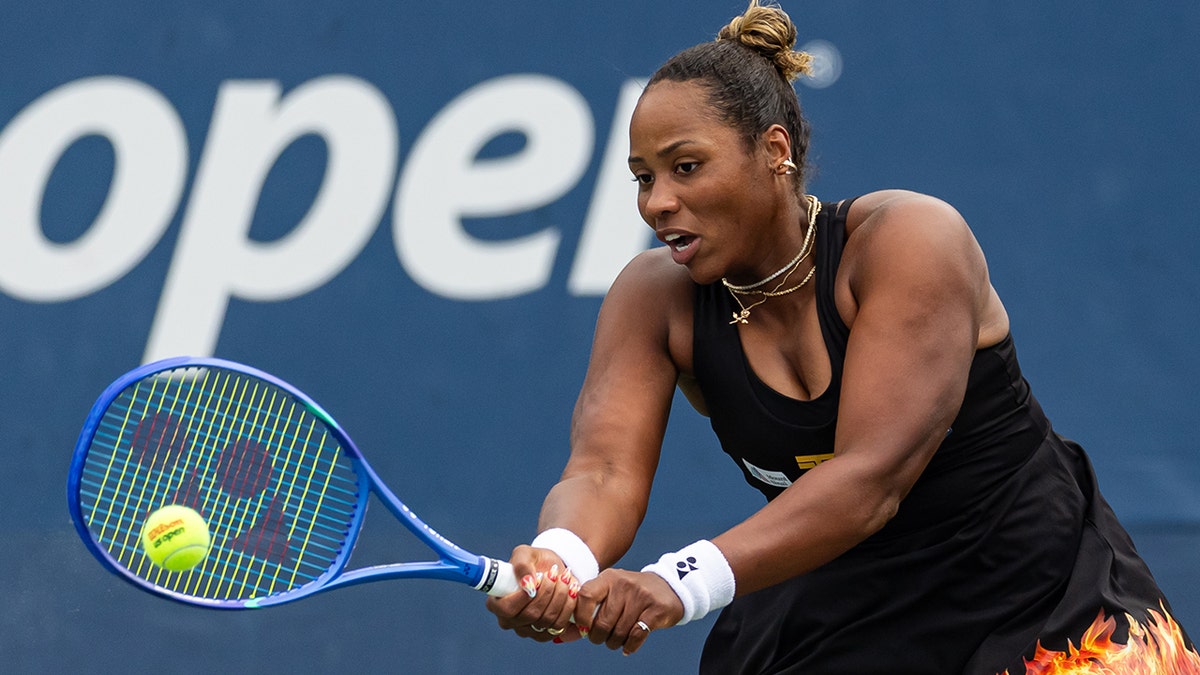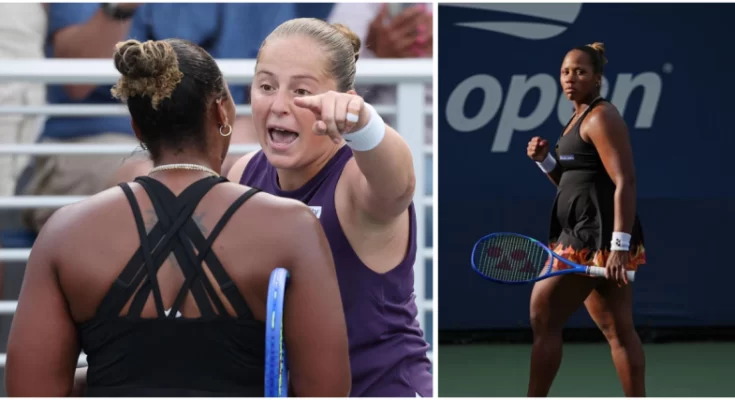Taylor Townsend and Jelena Ostapenko found themselves at the center of controversy during the US Open after a fiery post-match confrontation that highlighted not only the tension of high-stakes tennis but also the growing reputation of Townsend as a competitor who refuses to be intimidated. The match itself, played in front of a lively New York crowd, was already intense. Townsend fought hard to secure her place in the third round, while Ostapenko, known for her bold and unpredictable style, let frustration get the better of her in both performance and demeanor. What happened afterward, however, became the bigger talking point than the result itself.
The second-round clash was always going to be a fascinating battle of styles. Townsend, with her aggressive net play, strong serve, and willingness to mix things up tactically, has become a fan favorite for her fearless approach. Ostapenko, on the other hand, carries a reputation as one of the hardest-hitting players on tour, never afraid to swing freely and dictate play, but often showing flashes of temper when things don’t go her way. Their meeting was a contest of control versus chaos, patience versus raw firepower, and in the end, it was Townsend who held her nerve.
The American displayed tremendous composure during the match. Ostapenko started fast, blasting winners and setting the tone early, but Townsend weathered the storm. Using her variety, her ability to slice and come forward, and her smart adjustments to the Latvian’s pace, Townsend gradually took over the momentum. By the time the final set was underway, it was clear that she was not only matching Ostapenko physically but also rattling her mentally. Every missed shot from Ostapenko was met with visible frustration, and the crowd, sensing the tension, rallied behind Townsend.
When Townsend finally sealed the victory with a forehand volley at the net, the Arthur Ashe Stadium erupted. For her, it was a breakthrough moment, proof once again that she belongs on the biggest stages against some of the fiercest competitors in the world. Yet instead of a respectful handshake or mutual acknowledgment of a hard-fought battle, the post-match interaction sparked a heated scene.
At the net, Ostapenko offered what many viewers described as a “cold handshake,” barely making eye contact with Townsend. Words were exchanged immediately after. While microphones did not catch the full conversation, lip readers and courtside fans noted that Ostapenko appeared to accuse Townsend of “getting lucky” and “being disrespectful” during the match. Townsend, visibly caught off guard but unwilling to back down, responded firmly. She gestured toward the court as if to say her victory was earned through hard work, not luck.
The argument escalated briefly before both players went their separate ways, Ostapenko shaking her head and muttering as she walked to her chair, and Townsend raising her arms to the crowd in a gesture of triumph and defiance. Social media exploded within minutes. Clips of the exchange circulated widely, with fans taking sides. Some defended Ostapenko, noting that she is a passionate competitor who often wears her emotions on her sleeve. Others criticized her for a lack of sportsmanship, pointing to a pattern of similar incidents in her career.
For Townsend, the incident was both a distraction and an opportunity. On one hand, she made it clear afterward that she wanted the focus to remain on her tennis, not on drama. In her press conference, she acknowledged the confrontation but downplayed its significance. “It was a tough match, emotions were high,” Townsend said. “I respect Jelena as a player, but at the end of the day, I’m here to compete. I gave everything, and I earned that win. That’s what I’m taking with me.” On the other hand, the exchange added to her growing image as a fighter — someone who refuses to shrink in big moments, not on the court and not in the face of confrontation.
Ostapenko, meanwhile, was more pointed in her comments. She hinted that she felt Townsend’s celebrations during the match were excessive and disrespectful. “I just think sometimes players need to show more respect,” she said. “It’s fine to be happy when you win a point, but there are ways to do it.” Her remarks did little to quell the debate. To many fans and analysts, they sounded like the words of a player unwilling to give credit to an opponent who simply outplayed her when it mattered most.
The controversy raised broader questions about sportsmanship in tennis, especially on the women’s tour where emotions often run high in the heat of competition. Ostapenko has a history of fiery interactions with opponents, chair umpires, and even her own team. Critics argue that her inability to contain frustration undermines her immense talent, while supporters claim her raw, unfiltered demeanor adds color to the sport. For Townsend, who has battled through personal struggles, injuries, and the challenges of balancing motherhood with a professional career, the victory and subsequent clash were symbolic. She not only proved herself on the scoreboard but also stood tall against a former Grand Slam champion unwilling to give her due credit.

Townsend’s journey to this point makes the moment even more meaningful. Once touted as a teenage prodigy, she faced early career obstacles, including criticism about her fitness and playing style. She took breaks from the tour, dealt with self-doubt, and had to rebuild her career largely outside of the spotlight. In recent years, however, she has staged a remarkable comeback, reasserting herself as a dangerous competitor. Her net-charging game is rare in modern tennis, making her matches unpredictable and exciting. Every victory feels like a triumph not just for her but for fans who have followed her long and winding path.
This win over Ostapenko marked another chapter in that narrative. Advancing to the third round of the US Open is an achievement on its own, but doing so against a player with the pedigree and firepower of Ostapenko makes it even more significant. Townsend now has the chance to build momentum, and with the New York crowd firmly behind her, she could turn this run into something special.
As for the heated interaction, time will tell how it is remembered. Tennis has always had its share of rivalries and dramatic moments. From John McEnroe’s legendary outbursts to Serena Williams’ battles with umpires, the sport thrives on storylines that go beyond forehands and backhands. The Townsend-Ostapenko clash may not rise to the level of an iconic rivalry, but it adds spice to the tournament and reminds everyone that tennis is as much mental as it is physical.
Fans were quick to draw comparisons to other memorable confrontations. Some likened Ostapenko’s behavior to her past run-ins, such as disputes with officials during Wimbledon or terse exchanges with other opponents. Others praised Townsend for handling the situation with dignity, showing restraint in not letting the argument spiral further. The New York audience, known for embracing fighters and underdogs, seemed firmly in her corner, chanting her name as she left the court.
What remains clear is that Townsend is moving forward. Her focus, as she emphasized, is on preparing for the third round and making the most of her opportunity. For Ostapenko, the loss and the fallout could serve as motivation, or it could become another example of her struggles to manage emotions on the court. Either way, the US Open will remember this match not just for the quality of play but for the sparks that flew afterward.
In the broader picture, this incident is a reminder of why fans flock to the sport. Tennis thrives on personality, passion, and moments of raw honesty. The tension between Townsend and Ostapenko was unscripted drama, the kind that resonates with spectators long after the score is forgotten. For Townsend, it was also a turning point, proof that she can handle not only the physical challenge of a Grand Slam but also the psychological warfare that often comes with it.
As the tournament moves on, the spotlight will remain on her. Can she back up this statement win with another? Will she continue to carry the support of the crowd and use it as fuel? Those questions will define the rest of her run. For now, though, she has already left her mark on the 2025 US Open — not just with her tennis but with her refusal to be overshadowed by confrontation.
Townsend’s resilience, Ostapenko’s fire, and the raw emotion of their clash made for one of the most talked-about moments of the tournament’s early rounds. The tennis world will debate whether Ostapenko crossed a line or whether Townsend’s celebrations were over the top, but one thing is certain: both players showed just how much it means to them. In a sport where respect, rivalry, and passion collide, sometimes the biggest battles happen not only between the lines but also in the moments afterward.



